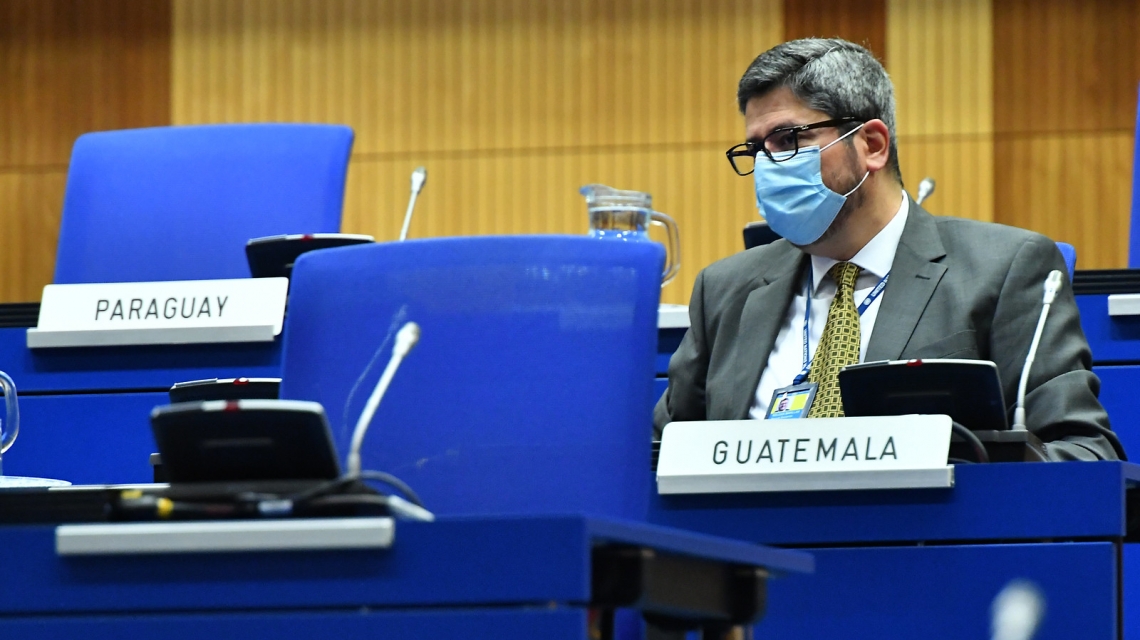With close to 20 ongoing projects in its regional portfolio, the Regional Cooperation Agreement for the Promotion of Nuclear Science and Technology in Latin America and the Caribbean (ARCAL) offers a key channel through which IAEA capacity building and development efforts are delivered in the region. The Board of ARCAL Representatives held their 21st meeting on 29 September-immediately after the week of the 64th IAEA General Conference-with the goal of reviewing the growing body of technical cooperation (TC) activities in Latin America and the Caribbean, and to launch a new regional strategic profile, Agenda ARCAL 2030.
The meeting, held partially online, was opened by the Chairperson of the Board, Ambassador Loipa Sanchez Lorenzo of Cuba, and by Director General Rafael Grossi, who welcomed the submission of 13 new project proposals, as well as the development of the new regional agenda.
"In analysing the thirteen projects, which are to be approved in this session, there is an interesting alignment between the projects, the Regional Strategic Profile and with the central points in the international nuclear agenda," said Mr Grossi. "I believe that the project portfolio for this 2020-2021 cycle is exceptionally rich."
In his remarks to the ARCAL representatives, Deputy Director General Dazhu Yang underscored ARCAL's long history of socioeconomic impact: "During the past 36 years, more than 170 projects proposed by ARCAL have supported regional priorities in human health, environment, food safety and agriculture, industry, energy, knowledge management and other areas," said Yang, who was joined by Deputy Directors General of Management, Nuclear Safety and Security, and Nuclear Sciences and Applications.
Participants finalized a new Regional Strategic Profile for Latin America and the Caribbean. Across six broad thematic areas-food and agriculture, human health, the environment, energy, nuclear safety and radiation technologies-the document identifies 44 specific development needs, and corresponding targets, to be addressed and met before the end of the decade.
Launching Agenda 2030
Entitled 'Agenda ARCAL 2030' and designed to align closely with the targets of the Sustainable Development Goals (SDGs), this strategic document establishes common needs and priorities in the region that can be addressed using nuclear science and applications. The document will inform the development and implementation of regional projects for the coming decade.
"Agenda ARCAL 2030 is a planning and monitoring tool that allows ARCAL State Parties to identify common challenges and to prioritize the projects proposed to the IAEA in a participatory and transparent manner," said Luis Carlos Longoria Gandara, Director of the TC Division for Latin America and the Caribbean.
"The fact that this document now clearly identifies the contribution of ARCAL projects to the SDGs is very important to demonstrate how nuclear technologies directly contribute to the UN's 2030 Agenda," said Longoria.

Due to health and distancing precautions, the regional meeting was organized and held as a hybrid event, benefitting from both virtual and limited in-person interventions. (Photo: D. Calma/IAEA)
Refocusing Programme Priorities
With more than 65 representatives and project counterparts in attendance, the meeting gave participants an opportunity to revisit and recommit themselves to ARCAL's gender-mainstreaming efforts, which have been a cornerstone of the regional agreement's ambitions in recent years.
"Since I became IAEA Director General last December, I have been committed to putting gender equality at the centre of everything we do-I want to tap into the best talent, energy and ideas," said Director General Grossi, who drew attention in his opening remarks to the growing participation of women and young girls in the field of nuclear science. "I strongly welcome ARCAL's efforts to increase the role played by women in its work and in the nuclear field more generally."
"Last year, ARCAL launched a series of annual workshops for young professional women and, this year, ARCAL launched its first project with a gender perspective," said Ambassador Sanchez Lorenzo. "The aim of this project is to support equal female participation in nuclear science and technology by empowering women and promoting their contribution to technical, scientific and leadership roles in the field."
The first virtual event organized under the newly-launched project took place on 12 September.
"It gives me great pleasure to hear about the genesis of an ARCAL project which precisely supports women, and to hear about the great transition occurring in the organization, as well as the growth in the employment of women," said Luis Javier Campuzano Pina, Secretary of the Board and Permanent Representative of Mexico to the IAEA, "and I believe this is the path we need to follow."
The ongoing COVID-19 pandemic was also an important topic at the meeting, both as regards the consequences for the implementation of the regional programme, and in relation to IAEA support in the fight against the virus. In coordination with Permanent Missions and nationally-designated laboratories, all 21 ARCAL countries have received assistance from the IAEA for the detection of COVID-19.
Background
ARCAL is an Agreement between most IAEA Member States in the Latin America and the Caribbean region for technical and economic cooperation to promote the use of nuclear techniques for peace and development
The Regional Cooperation Agreement for the Promotion of Nuclear Science and Technology in Latin America and the Caribbean was established in 1984. It provides a framework for Member State collaboration with the support of the IAEA and other international sources of cooperation. The Agreement addresses key development priorities in the region, focusing on pressing needs related to food security, human health, environment, energy, industry and radiological safety.
At present, 21 countries are party to the ARCAL Agreement: Argentina, Bolivia, Brazil, Chile, Colombia, Costa Rica, Cuba, Dominican Republic, Ecuador, El Salvador, Guatemala, Haiti, Honduras, Jamaica, Mexico, Nicaragua, Panama, Paraguay, Peru, Uruguay and Venezuela. Since 2007, Spain has participated as a strategic partner of ARCAL.






